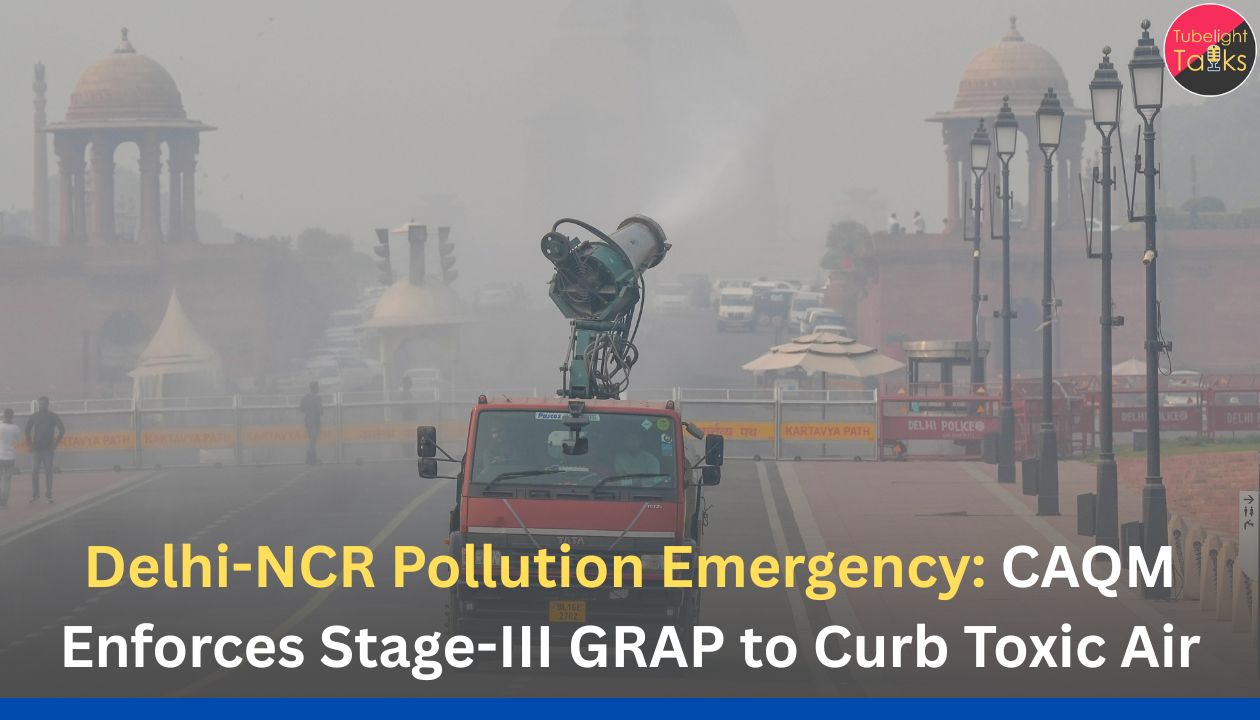Delhi-NCR Pollution Emergency: CAQM Enforces Stage-III GRAP to Curb Toxic Air
Delhi-NCR Pollution Emergency: In a swift response to worsening air quality across Delhi and the National Capital Region (NCR), the Commission for Air Quality Management (CAQM) has invoked Stage-III of the Graded Response Action Plan (GRAP). The decision came into immediate effect on November 12, 2025, amid persistent “severe” AQI levels in several parts of NCR. This action signifies a critical escalation in the government’s pollution-control strategy.
What is GRAP and Why Stage-III Matters?
Understanding GRAP
The Graded Response Action Plan (GRAP) is a set of emergency measures adopted by the Government of India to tackle air pollution in NCR. It is enforced in stages (I to IV) based on real-time Air Quality Index (AQI) levels:
- Stage-I: AQI 201–300 (Poor)
- Stage-II: AQI 301–400 (Very Poor)
- Stage-III: AQI 401–450 (Severe)
- Stage-IV: AQI >450 (Severe+)
With current AQI levels hovering above 420 in many NCR districts, Stage-III has been activated without delay.
Key Authorities Involved
The implementation of GRAP is overseen by:
- CAQM (Commission for Air Quality Management)
- Central Pollution Control Board (CPCB)
- State Pollution Control Boards
- District Administrations of Delhi, Haryana, UP, and Rajasthan
Official Notification: CAQM Official Update
Immediate Restrictions Under GRAP Stage-III
1. Construction and Demolition Ban
All non-essential construction and demolition activities are prohibited across NCR. Exceptions are made for:
- National security or defense projects
- Metro rail, highways, and airport construction
- Public utility projects (water, sanitation, electricity)
2. Ban on Diesel Gensets
Usage of diesel generator sets, except for emergency and hospital use, is banned.
3. Closure of Brick Kilns and Hot Mix Plants
Pollution-emitting units like brick kilns and hot mix plants (except those running on clean fuels) are shut down.
4. Suspension of Mining and Stone Crushing Activities
To reduce particulate matter (PM 2.5 and PM 10), all mining and stone crushing in NCR is halted temporarily.
5. Curtailment in Vehicle Movement
The government has advised a ban or restriction on BS-III petrol and BS-IV diesel four-wheelers in Delhi and neighboring cities.
6. Work-from-Home Advisory
Private firms and offices are advised to switch to 50% work-from-home for employees to reduce vehicular emissions.
Health Impact: Breathing Toxic Air
The Air Quality Index crossed severe levels (AQI >400) in parts of Delhi, Noida, Ghaziabad, and Gurugram.
Doctors report rising cases of:
- Asthma attacks
- Respiratory infections
- Eye irritation and sore throat
- Hospital admissions for COPD and bronchitis
The Indian Medical Association (IMA) has urged residents to stay indoors and wear N95 masks when venturing outside.
Experts Speak: Why the Air Quality is Deteriorating
Causes Behind the Spike in Pollution:
- Stubble burning in Punjab and Haryana (satellite data confirms fire counts increased by 37% over last week)
- Low wind speeds, causing stagnation of pollutants
- Vehicular emissions due to festive and wedding season traffic
- Construction dust from urban projects
According to SAFAR-India (System of Air Quality and Weather Forecasting and Research), these conditions are expected to persist for at least 5 more days.
Government and Civic Response
- Anti-smog guns deployed in Delhi hotspots
- Water sprinkling on roads to settle dust
- Mobile pollution check vans activated at traffic chokepoints
- School closures being considered in affected districts
CAQM has also warned of stricter Stage-IV GRAP if conditions worsen — a move that may include a full halt to truck entry and construction.
A Deeper Look: The Spiritual Pollution Behind Air Crisis
Pollution of the Soul, Pollution of the Earth
While measures like GRAP address the visible aspects of pollution, the invisible root cause often goes unchecked — spiritual imbalance. According to Sant Rampal Ji Maharaj, the degradation of natural systems is not just scientific but karmic.
His teachings emphasize:
“When humans forsake true worship and righteous conduct, nature mirrors that imbalance through calamities.”
In the spiritual realm, pollution arises from:
- Ego, greed, and selfishness
- Disrespect for nature and divine law
- Disconnection from the Supreme Power
Sant Rampal Ji Maharaj explains that by taking Naam Diksha (initiation) and following the path of Satbhakti (true devotion), we can not only protect our environment but also purify our soul. His spiritual discourses offer a comprehensive solution — physical, environmental, and spiritual — to the crises we face today.
To know more, visit JagatGuruRampalJi.org or watch teachings on YouTube
Read Also: Delhi-NCR’s November Smog: GRAP Rules, AQI Reality, Protests—And How to Protect Your Health
FAQs on GRAP-III Implementation in Delhi-NCR Pollution Emergency
1. What is Stage-III of GRAP?
It includes emergency pollution-control measures such as halting construction, banning diesel gensets, and restricting vehicular movement due to “severe” AQI levels (401–450).
2. What activities are banned under GRAP Stage-III?
All non-essential construction, mining, stone crushing, and the use of diesel generators (non-emergency) are banned.
3. Are schools and colleges closing in NCR?
Not yet officially, but state governments are reviewing the situation. Online classes are being recommended.
4. How long will Stage-III GRAP remain in effect?
Until air quality improves below “severe” levels. CAQM reviews the status daily.
5. Is stubble burning still the main reason for NCR pollution?
Yes, along with weather conditions and local emissions. Satellite imagery shows a rise in farm fire activity in Punjab and Haryana.
6. Where can I track real-time air quality?
You can use SAFAR (safar.tropmet.res.in) or CPCB’s website (cpcb.nic.in) for real-time AQI updates.











Discussion (0)